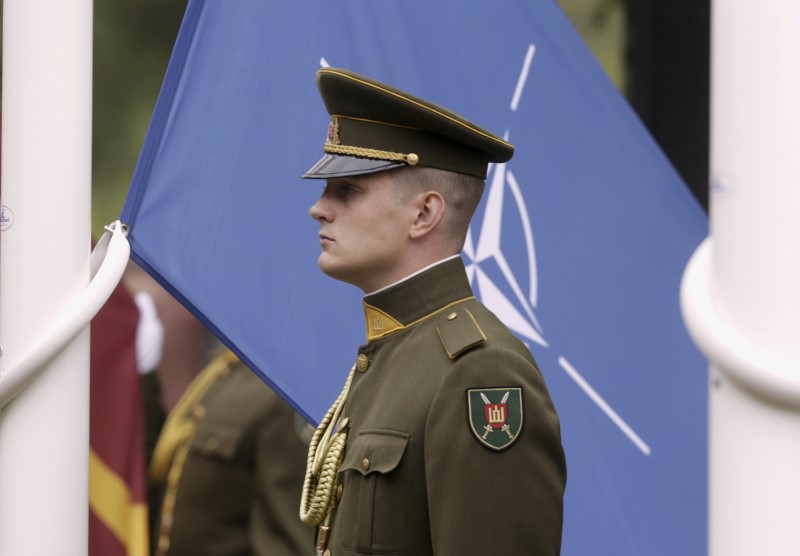By Robin Emmott and Andrius Sytas
VILNIUS (Reuters) - Leaders in the Baltic countries and Poland fear the force NATO plans to deploy on their territory is too small and symbolic to deter an attack by Russia, whose 2014 annexation of Crimea is fresh in the memories of the former Soviet-bloc states.
They will this week press other ministers of the western military alliance to help them build an air defense system against Russian aircraft and missiles. But that would be a highly sensitive step, likely to be condemned by Moscow as yet more evidence of a NATO strategy threatening its borders.
Asked about the likelihood of Russian aggression in the Baltics, Lithuania's Defense Minister Juozas Olekas told Reuters: "We cannot exclude it ... They might exercise on the borders and then switch to invasion in hours."
Lithuania, Latvia and Estonia see themselves on the front line in any potential conflict with Moscow and say they are putting their armies on a war footing, meaning they can be mobilized almost immediately.
NATO defense ministers are set to agree this week on a new multinational force of 4,000 troops for the Baltics and Poland.
The United States, Germany and Britain are set to lead battalions of about 1,000 troops each. Canada may lead a fourth.
While the Baltic nations welcome the deployments, they say the build-up must go further - pointing to Russia's efforts to develop an "anti-access" capability in the Kaliningrad exclave bordering Lithuania and Poland, using missiles and submarines to stop NATO moving reinforcements into the Baltics.
The Baltics want NATO fighters to protect their skies and are seeking medium-range missile interceptors from Norway's Kongsberg Gruppen (OL:KOG) and U.S. defense contractor Raytheon (N:RTN).
"We need to stop possible air aggression," said Olekas. "We are discussing creating a regional medium-range air defense system together with the Latvians, the Estonians and the Poles."
Olekas expects to raise the matter with NATO colleagues at the ministers' meeting on Tuesday and Wednesday in Brussels.
CREDIBILITY
The head of the Estonian defense force Lieutenant General Riho Terras said: "The first and foremost is the defense of our airspace. Air defense is the challenge that needs to solved together with the NATO alliance."
"We are not talking about defense of Lithuania, we are talking about the credibility of the whole alliance," said Lithuania's Foreign Minister Linas Linkevicius.
But such calls would require stretched NATO governments to beef up the so-called air policing mission that regularly intercepts Russian jets flying over international waters close to the Baltic states.
The Baltic nations rely on their NATO allies' quick reaction aircraft to patrol their skies, with no mandate to confront hostile aircraft in a conflict.
Four British Eurofighter Typhoon fighter jets and four Portuguese F-16 fighter jets are currently carrying out the air policing mission. Officials say a lot more would be needed for air defense.
And southern NATO nations, focused on uncontrolled migrant flows and the failing states on Europe's borders, may also be unwilling to grant more resources to the eastern flank.
Ben Hodges, the commander of the U.S. army in Europe, visited Vilnius last week. He echoed Baltic concerns about the strength of NATO's deterrence.
"It is a transition," Hodges said. "I hope that includes serious war fighting capabilities. Just putting garrisons of troops sitting in the countries ... will not deter."
Russia insists it poses no threat to the former Soviet states. Top NATO officials say talk of an impending attack is misleading, a view shared by Paris and Berlin.
Russia has held unannounced exercises on the borders of the Baltics, including one in 2014 which mustered 100,000 troops, according to Danish Colonel Jakob Sogard Larsen, who heads the new NATO command outpost in Lithuania.
"You see it differently when you live here," Larsen said.
"We need to learn to fight total war again," he said, in a sign of the return of a Cold War-style mood.
Lithuanian officials accuse Russia of trying to buy off Lithuanian soldiers and business people to become spies for the Kremlin, intimidating diplomats and spreading disinformation on the Internet and television.
Prosecutors are preparing to file criminal charges against someone they say is a high-ranking Russian intelligence officer arrested last year trying to recruit informants.
Russia denies any such activities.
SWITCH TO "CLASSIC WARFARE"
The NATO battalions are part of a deterrent to be approved by leaders at a summit in Warsaw in July. That will involve forces on rotation, warehoused equipment and a "spearhead" force backed by NATO's 40,000-strong rapid reaction force.
Once the decision is made, Germany could deploy to Lithuania before September. Britain is expected to deploy to Estonia, the United States to Latvia and Canada possibly to Poland.
German and Danish soldiers fanned out across swamps and woodland in Lithuania this week in war games to learn the unfamiliar Baltic terrain and test their ability to move equipment and personnel quickly to a possible front.
Their tanks and armored vehicles were recently brought back from Afghanistan, desert-yellow camouflage painted over with the green-and-black colors of Baltic woodlands.
"We are changing our focus from counter-insurgency tactics back to classic warfare," said German Lieutenant Colonel Marc-Ulrich Cropp from his camouflaged command tent at a Lithuanian military base. "Everyone has to be prepared."
